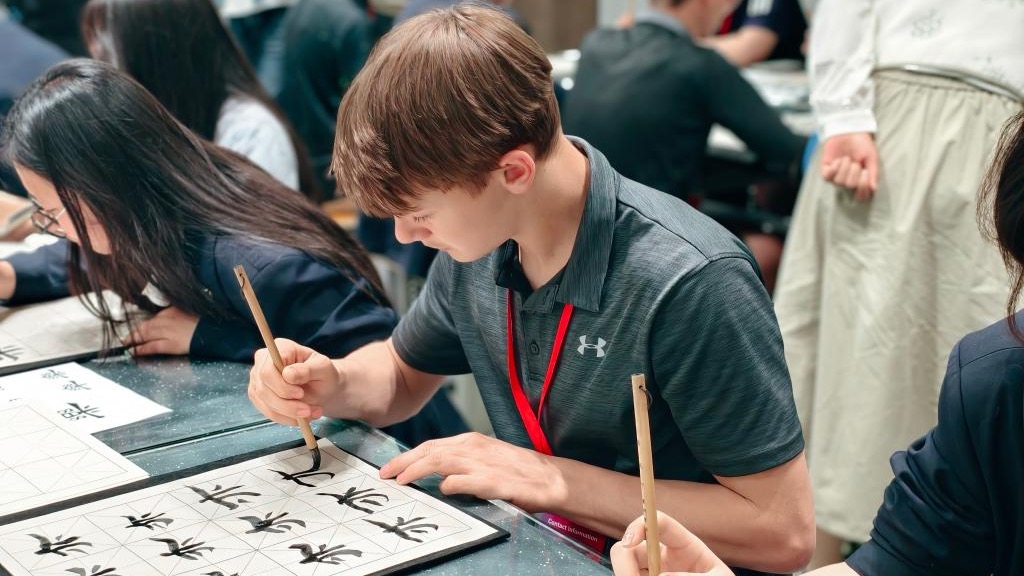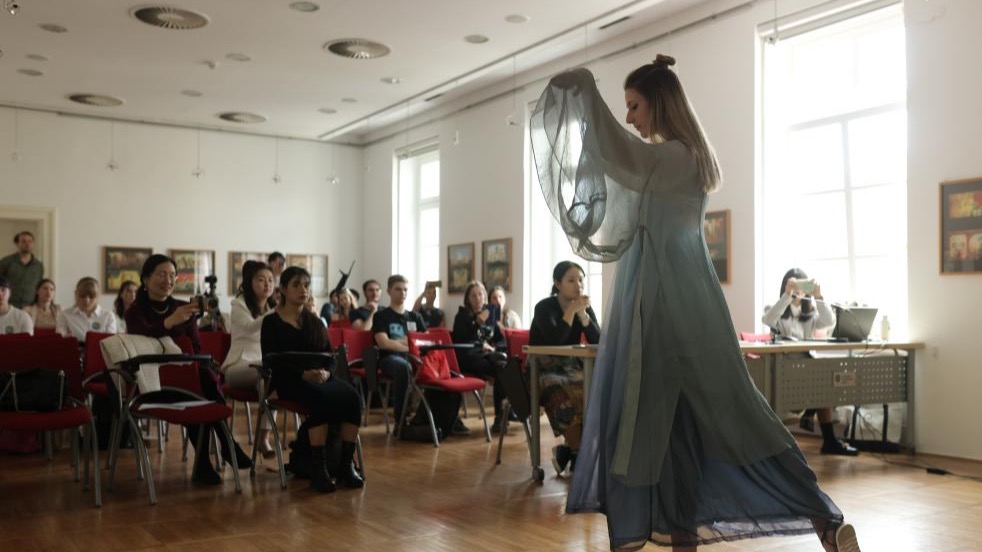Home > > Pooling the strength of China-Europe civilization exchanges
Pooling the strength of China-Europe civilization exchanges

An overseas student practices Chinese calligraphy during a study tour in Shijiazhuang, north China's Hebei province, April 26, 2025. /Xinhua
We all live in the same global village, and we are all passengers on the same boat. Challenges cannot be addressed and a better future cannot be achieved without the power of civilization. How we look at different civilizations reflects on human progress and peaceful development of the world. Chinese President Xi Jinping pointed out, "promoting exchanges, mutual learning and coexistence among different civilizations is the only way to make the world a better place and to improve people's lives."
Throughout human history, China and Europe have not only deeply influenced each other as two major civilizations, but also contributed significantly to the advances of human civilization.
The echo from history: Chinese and European civilizations in equally-footed exchanges
Asia and Europe were connected by the ancient Silk Road, which opened the door to exchanges between the two continents, and planted the seeds of seeking common ground while respecting differences. In modern history, European knowledge was spread to China, and Chinese thinkers of the Ming and Qing dynasties studied Western works, catalyzing the rise of practical learning.
At the same time, European thinkers of the Enlightenment period drew inspiration and insights from Eastern wisdom: Voltaire referred to himself as a disciple of Confucius; G. W. Leibniz studied Confucianism from philosophical and theological perspectives and wrote Discourse on the Natural Theology of the Chinese; François Quesnay found in Confucian thought the intellectual foundation for his economic theories – the natural order. The spread of ancient China's Four Great Inventions helped Europe emerge from the dark Middle Ages.
In the early exchanges between Chinese and European civilizations, there may have been debates, doubts and rejections, but far more prevalent were learning, integration and innovation. History has irrefutably demonstrated that civilization does not mean conquering or remolding others, nor does it mean viewing other civilizations as rivals. China and Europe can fully appreciate each other, engage in equal-footed dialogue, achieve mutual success and set an example for the world.
The call of our times: The power of civilization integration showcased over the past five decades
On May 6, 1975, far-sighted leaders of China and Europe, overcoming the mindset of civilization confrontation of ideological differences, established diplomatic ties with extraordinary political courage. Over the past 50 years, Chinese and European people have been moving forward together, upholding the principles of equality and respect and fostering the growth of both civilizations through dialogue and harmonious coexistence.
In 2003, the two sides issued policy documents to further promote comprehensive relations, with strengthening people-to-people exchanges a key part of them. In 2012, the China-EU High-Level People-to-People Dialogue was officially established, and with the efforts of Chinese and European leaders, this mechanism has yielded rich results, creating a comprehensive, multi-tiered and wide-ranging framework for people-to-people exchanges, alongside the China-EU high-level strategic dialogue, economic and trade dialogue, environment and climate dialogue and digital dialogue.
In education, an increasing number of Chinese students study in Europe, while tens of thousands of young Europeans come to study or undertake short-term programs at Chinese universities. China has signed agreements on mutual recognition of academic degrees, qualifications and diplomas with over 20 EU member states. Institutions like the China Europe International Business School, the China-EU School of Law and the China-EU Institute for Clean and Renewable Energy have become exemplary models of China-Europe cooperation in higher education.
Language teaching cooperation thrives; Chinese language is a hit across Europe, and Chinese universities now offer programs in all 24 official EU languages. China has proposed an initiative to boost educational cooperation, i.e. to have over 10,000 French students study in China and double the number of European youths participating in China-Europe exchange programs within the next three years, and has also established the "Youth Envoys Scholarship Program," encouraging European young people to study in China.

A contestant performs during the 2024 "Chinese Bridge" Chinese proficiency competition in Ljubljana, Slovenia, May 15, 2024. /Xinhua
In culture and tourism, European classical music, Spanish Flamenco dance and Italian opera have long become cultural icons popular among Chinese people. China has jointly hosted cultural and tourism years with countries such as Italy, Greece, Spain and France, making cultural and tourism exchanges highly popular between the two sides.
Cultural centers established by China and European countries host diverse cultural events, serving as vital platforms for enhancing mutual understanding. Collaborative projects such as the Center of Chinese and Greek Ancient Civilizations and the Chinese School of Classical Studies at Athens, the pioneering projects of twinning relationships between Chinese and Italian world heritage sites and joint commemorations of the 700th anniversary of Marco Polo's death, showcase the harmony between ancient civilizations and their contemporary significance.
China has implemented unilateral visa-free policies for 32 European countries (including all 24 EU member states) and provided more convenient payment options as well as a better language and travel environment for inbound tourists. Currently, 600 weekly flights connect China and Europe, enabling more and more Europeans to travel to China.
The past 50 years has shown that China-Europe civilization exchanges have powerfully promoted harmony and prosperity. This is not only an echo of history but a resounding theme of our times.
Aspirations for the future: Advancing human society towards a brighter future through integration and mutual learning
In today's world, multiple crises and challenges are interwoven, and human society stands once again at a historical crossroads. The future of different people has never been so closely interconnected, and human civilization has never been in greater need of exchange and mutual learning.
Chinese civilization advocates "harmony in diversity," while Europeans believe in "unity in diversity." With distinct history and cultures, both civilizations have fostered the wisdom of inclusivity over the millennia, which has transcended racial and cultural differences. This is not only the lifeblood that has sustained these civilizations, but also a beacon for addressing the difficulties of our times.
As two major forces, markets and civilizations of the world, promoting the harmonious coexistence of different civilizations and safeguarding world peace and development are both a historical mission and the shared responsibility of China and Europe.
Standing at this new starting point, China and Europe should keep to a correct mutual perception and always regard the other side as a partner, further expand people-to-people exchanges, fully leverage the role of dialogue mechanisms, make people-to-people exchanges more substantive and cultivate new growth areas for cooperation. The two sides should jointly safeguard a favorable cooperative environment, remove interference and obstacles, enhance strategic mutual trust and people-to-people bonds and pool the strength of civilization integration.
Over 400 years ago, an eminent scholar named Feng Yingjing of the late Ming Dynasty said, "be it the eastern or western seas, human hearts are the same." More than 300 years ago, G. W. Leibniz wrote in Novissima Sinica: "China and Europe represent the two peaks of human culture. If the West and the East strengthen cooperation and cultural exchange, they can achieve a world of perfect harmony."
Standing in the 21st century, we are confident that China and Europe in the 21st century can transcend civilization differences with a more innovative and inclusive mind, and, together, lead both civilizations towards a better future.
(Wu Sheng is an international affairs observer.)
CGTN 2025-07-24
-
Xi urges all-out flood relief efforts
Xi urges all-out flood relief efforts
-
Xi urges youths to champion vision of peace
Xi urges youths to champion vision of peace
-
China, US gear up for pivotal trade talks
China, US gear up for pivotal trade talks
-
EU called on to make right choices
EU called on to make right choices